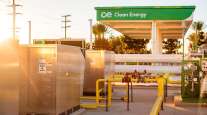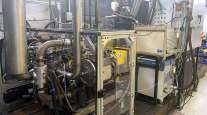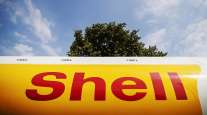Shell Sets Campaign to Boost Natural Gas; Plans LNG Plant, Distribution in Canada
This story appears in the Sept. 19 print edition of Transport Topics. Click here to subscribe today.
Global petroleum provider Shell Oil Co. unveiled a major push to promote natural gas in North American freight transportation, saying that it aims to produce liquefied natural gas suitable for commercial vehicles in a plant near Calgary, Alberta, by 2013.
While Shell is seeking regulatory approval for the LNG production at its Jumping Pound facility, the company also said Sept. 7 that it will supply Shell Flying J truck stops in Canada with LNG through third parties until it can supply the product itself.
Shell said in the same statement that it will work with Westport Innovations Inc., Vancouver, British Columbia, on truck engines powered by LNG and compressed natural gas.
“With an abundance of natural gas and a growing need for low-emission transportation fuels, today signals a very important step for a significant North American resource,” said Marvin Odum, president of Shell Oil Co. in the Americas.
“As global demand for transportation fuels increases, including for LNG, Shell is well-positioned to meet this demand. LNG can provide great advantages for our commercial customers as a future energy solution in transportation. LNG will be a welcome addition to Shell’s portfolio of quality transportation fuels,” said Odum.
Shell Flying J is a Canadian joint venture between Shell and Pilot/Flying J Travel Centers. Shell also is partnering with General Electric Co. on natural-gas train locomotives and with Wärtsilä North America Inc., Fort Lauderdale, Fla., on natural gas for large marine engines and stationary engines.
Clean Energy Fuels Corp., Seal Beach, Calif., has accumulated investors to fund its business plan of providing CNG and LNG as transportation fuel. In August, the company announced $150 million in backing from three investment funds. In July, Clean Energy Fuels received a $150 million investment from Chesapeake Energy Corp., Oklahoma City. Investor T. Boone Pickens owns 25.9% of Clean Energy Fuels’ stock, according to Bloomberg News.
Shell, however, with $368.1 billion in revenue last year, is one of the world’s largest corporations. A company spokesman would not reveal the size of its investment, but the announcement mentioned several approaches to the issue, including three modes of transportation and applications for mining equipment.
“As a result of this initiative, we believe the use of natural gas as a fuel for transportation will accelerate,” David Demers, CEO of Westport Innovations, said in his company’s statement.
Westport and Shell said they would address issues such as fuel supply, vehicle maintenance and customer support. In addition to its own products, Westport produces engines through a joint venture with Cummins Inc., Columbus, Ind.
In a briefing on energy issues with editors and reporters this summer,
Shell said natural gas is one of the corporation’s key strategies. The company expects crude oil and conventional diesel to keep rising in price over the long term, thereby making natural gas more appealing in comparison. Furthermore, natural gas is distributed across the world more broadly, including North America, meaning that its supply is not held hostage to political instability in the Middle East.
North American truck makers are marketing both heavy-duty and medium-duty vehicles that use CNG and LNG engines, and the Toronto office of consulting firm Frost & Sullivan estimates that their share of the Classes 6-8 market will increase notably between now and 2017 (8-29, p. 3).




